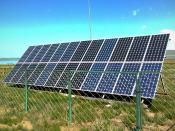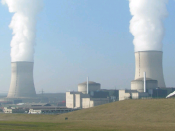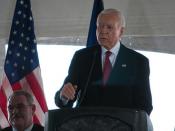On August 8, 2005 President bush signed an energy bill. Basically incorporating a lot of tax breaks. Electric utilities will save 3.1 Billion over 10 years. The coal industry will save 2.9 billion and the oil/gas business will save 2.7 billion.
Consumers will receive tax credits for rooftop solar panels, $500 for home energy improvements, and from $500 to $3,400 in credits for the purchase of hybrid gasoline-electric cars or other "cleaner" vehicles.
There are two types of solar panels the majority of people will buy. First, a mini solar panel. Which can be easily installed on the roof or in the yard. The purpose of the mini panel will be to supply electricity to a water heater or other small house hold electronics. Second, would be the master panel. This is typically installed on the roof of homes. Master panels supply the entire home with electricity. This means no electric bill.
Another advantage to this panel would be selling your electricity. Surplus electricity can be sold to the electric company. Rather than writing a check to the electric company--the electric company will be writing you a check.
Hybrid cars are a major fad right now considering the cost of fuel and the price tag on these vehicles. If we look at European countries the majority of their vehicles run on diesel fuel. Diesel fuel provides a similar gas mileage as the hybrid cars currently do--but many of these cars are not available in the United States. On Monday I did some research on this statement I made. The research was done in Columbia, SC at Dick and Dyer Mercedes. The e-class Mercedes come in two models Diesel and Regular gas. Regular gas averaged 16 mpg. While the diesel averaged 27. This is a similar mileage of hybrid cars.
I also have a chart that will show you the yearly estimate and comparison of hybrid and regular gas vehicles. If you would like to see it just email me. The yearly mileage is set for 20,000 and the gas price $2.85. The average savings with this projection is $1,200. Also, for you race fans NASCAR is considering hybrid cars.
The most you can expect to save on a good hybrid would be 50%. These vehicles also cost from $3,000 to $10,000 more than the standard vehicle. Again, the costs may be offset by incentives the government gives for cleaner vehicles. Cleaner burning fuel does not solve the problem of foreign dependency.
Even President Bush acknowledged that the Energy Bill will have little or no impact here-and-now. This bill calls for nearly doubling production of fuel additive ethanol by 2012 but does little else to reduce U.S. dependence on foreign oil.
One of the problems is that immediate action is needed. New Nuclear power plants will not begin operation until 2014 at the earliest. The average cost for a new nuclear plant is $1.2 billion.
That compares with $1.2 billion for a new coal plant or $500 million for a gas-fired facility, which is quicker to build.
The public is really beginning to accept Nuclear power. In 1995 the acceptance rate was 46% and 2005 70%. Regardless of finding more electrical sources, the problem of alternative fuel and foreign dependency is not really addressed. Yet the president poses one solution "If you do not need gas, do not buy gas--Conserve."
Information came from BusinessWeek Sept 5/Sept 26 issue, and www.energy.senate.gov.


